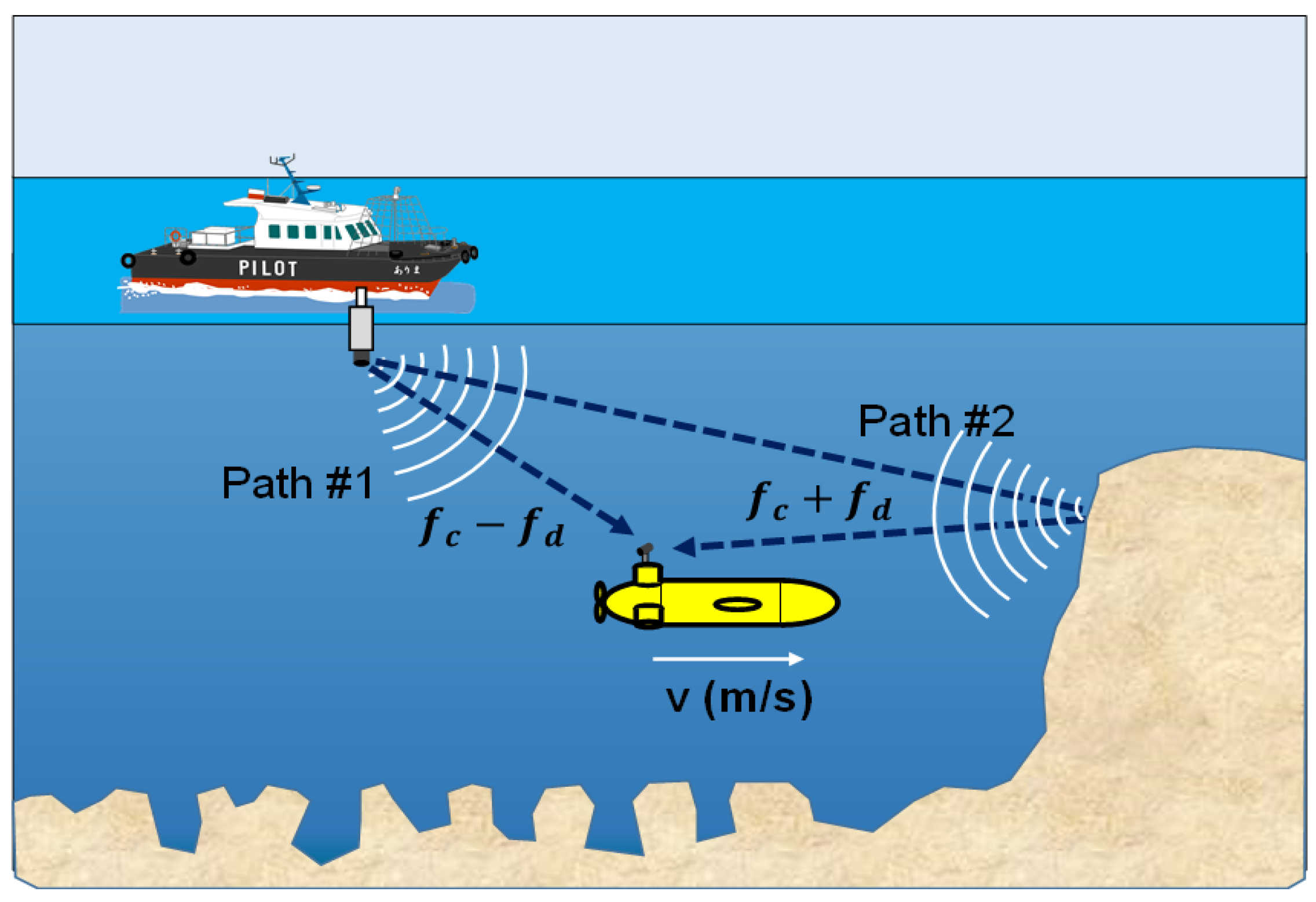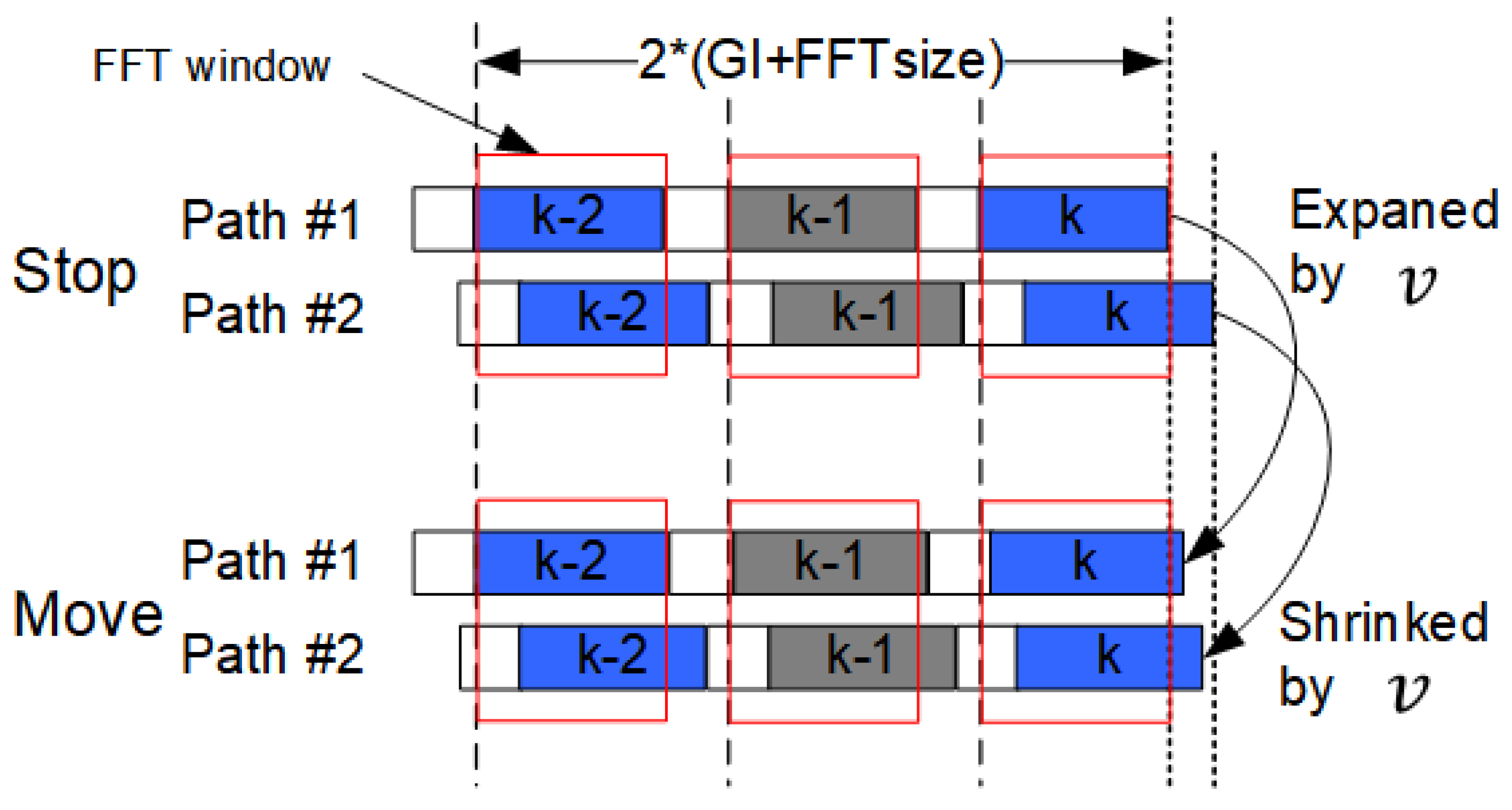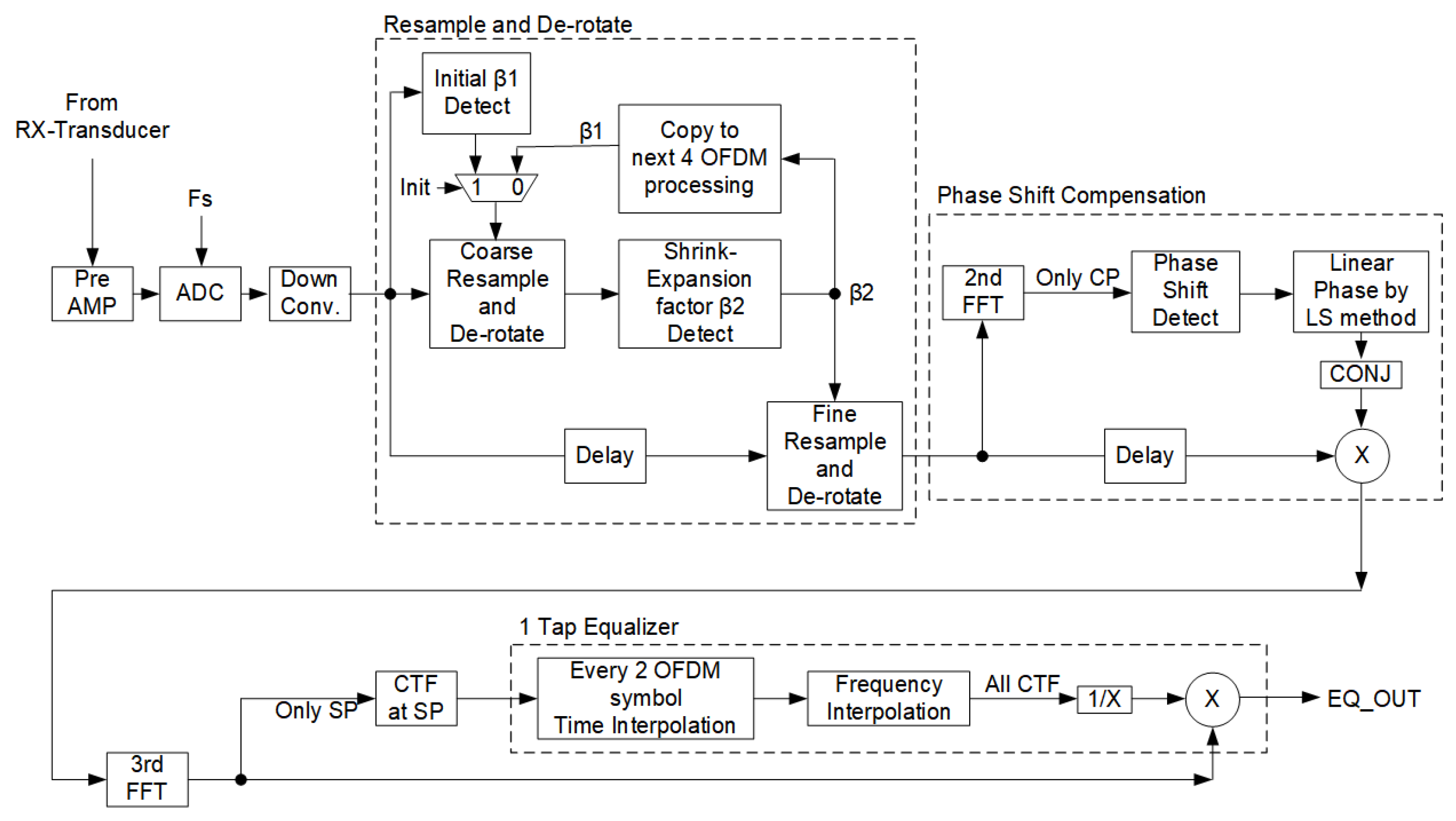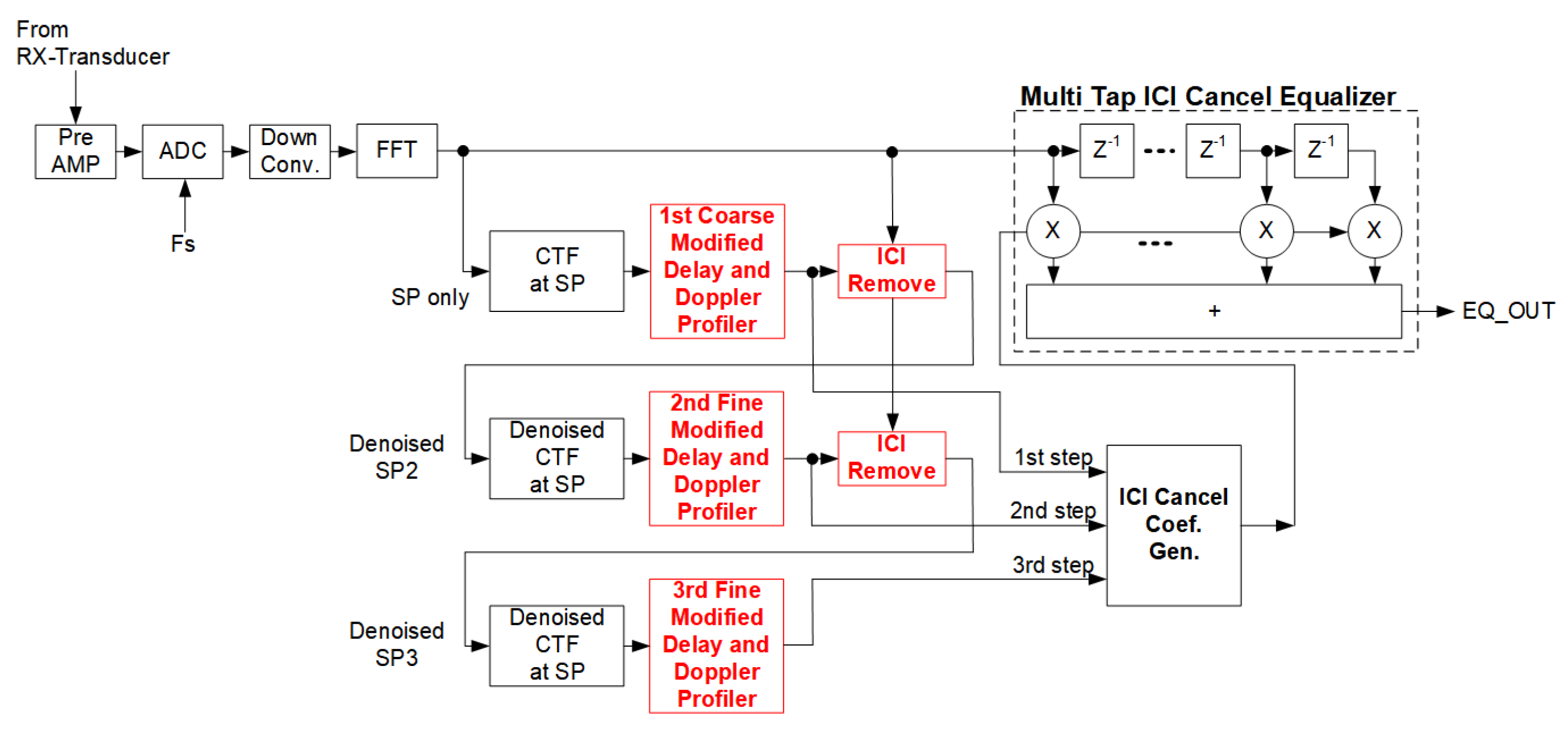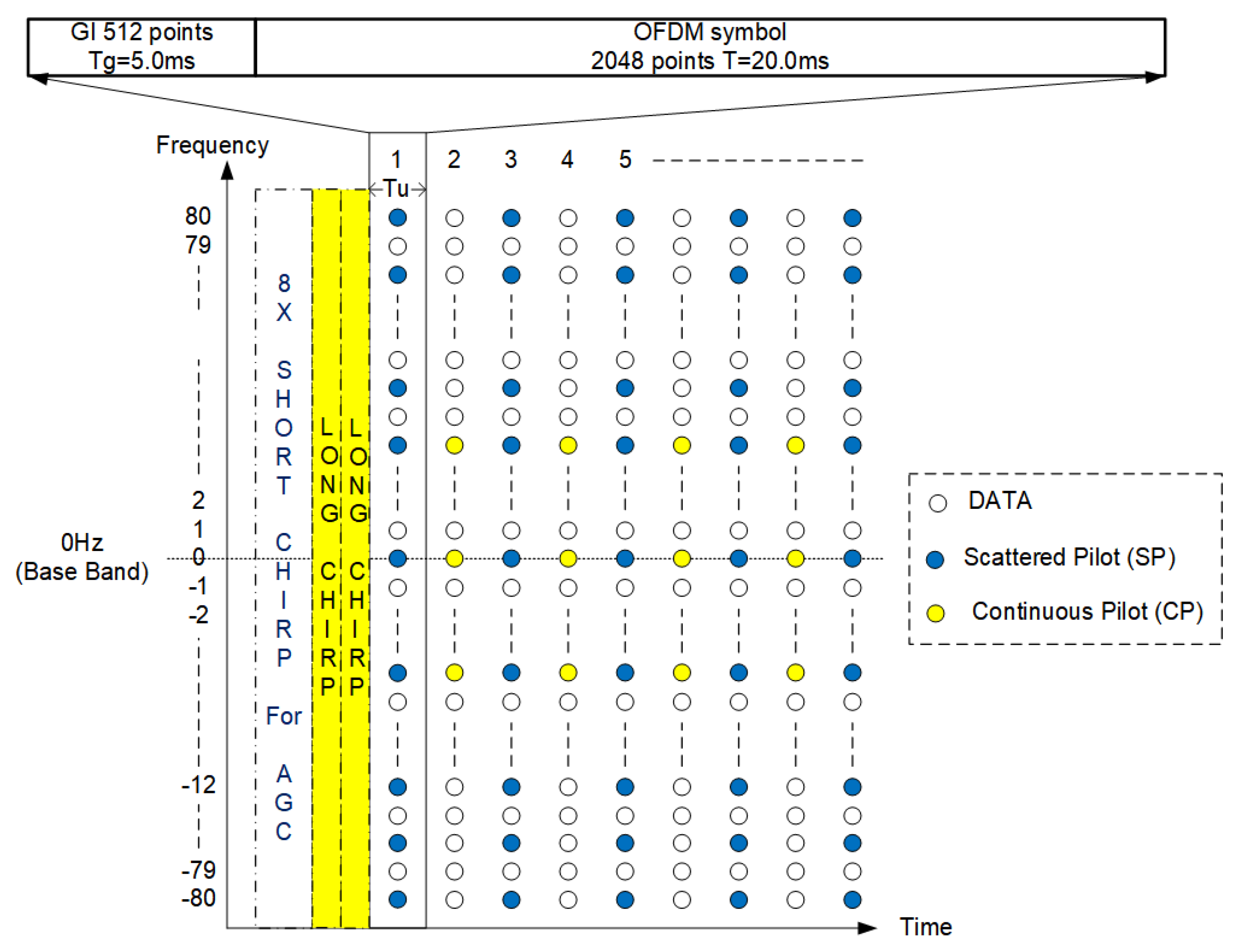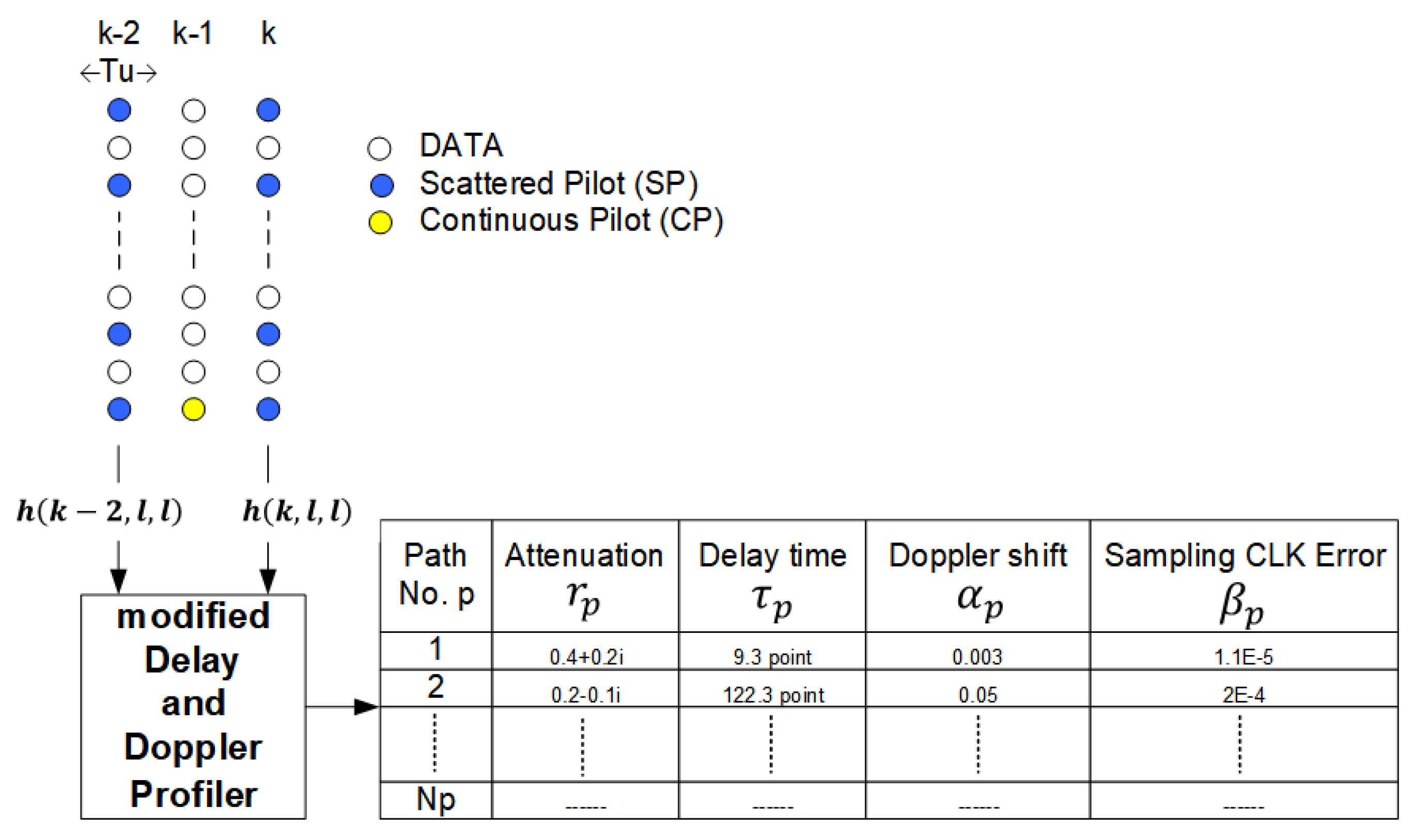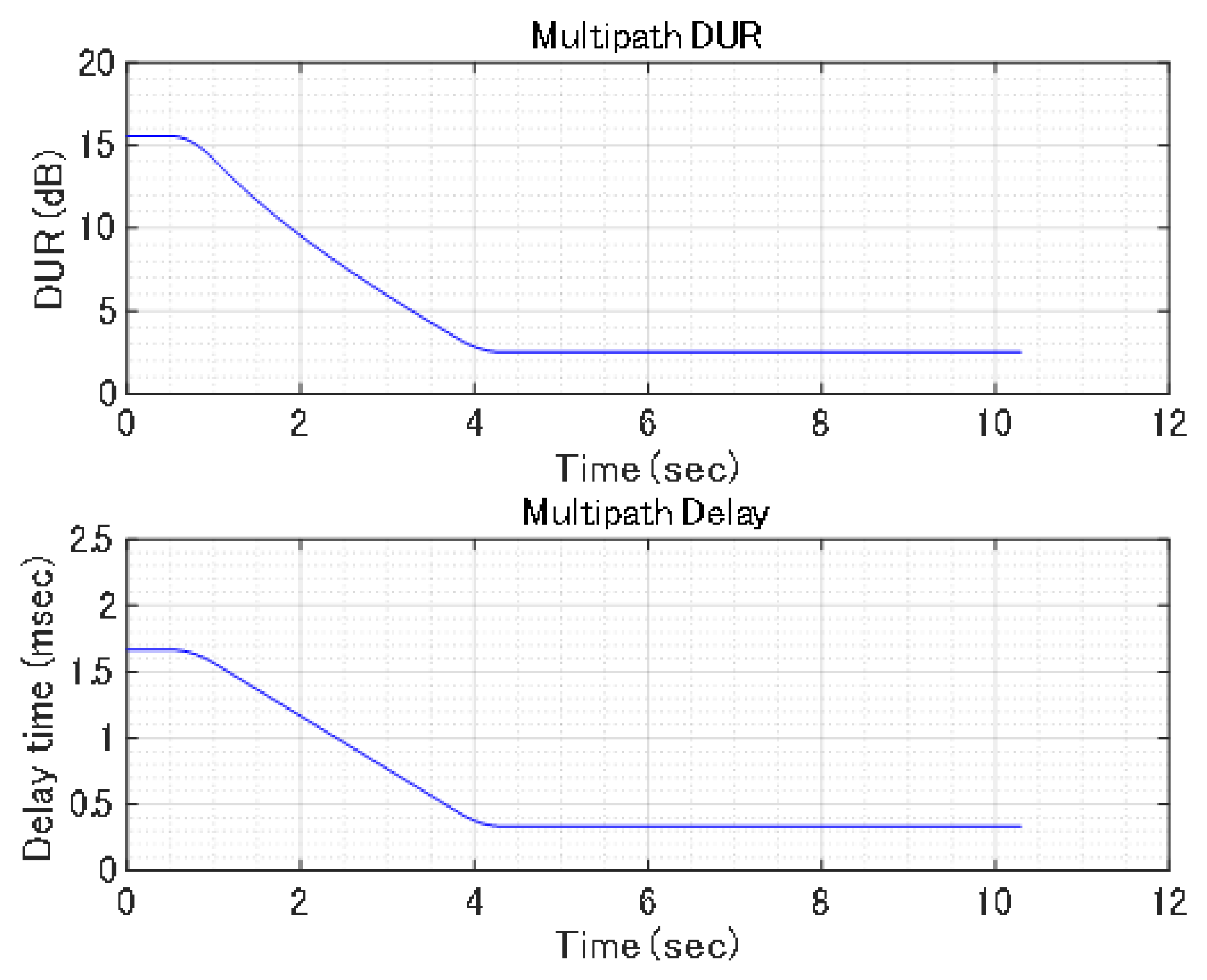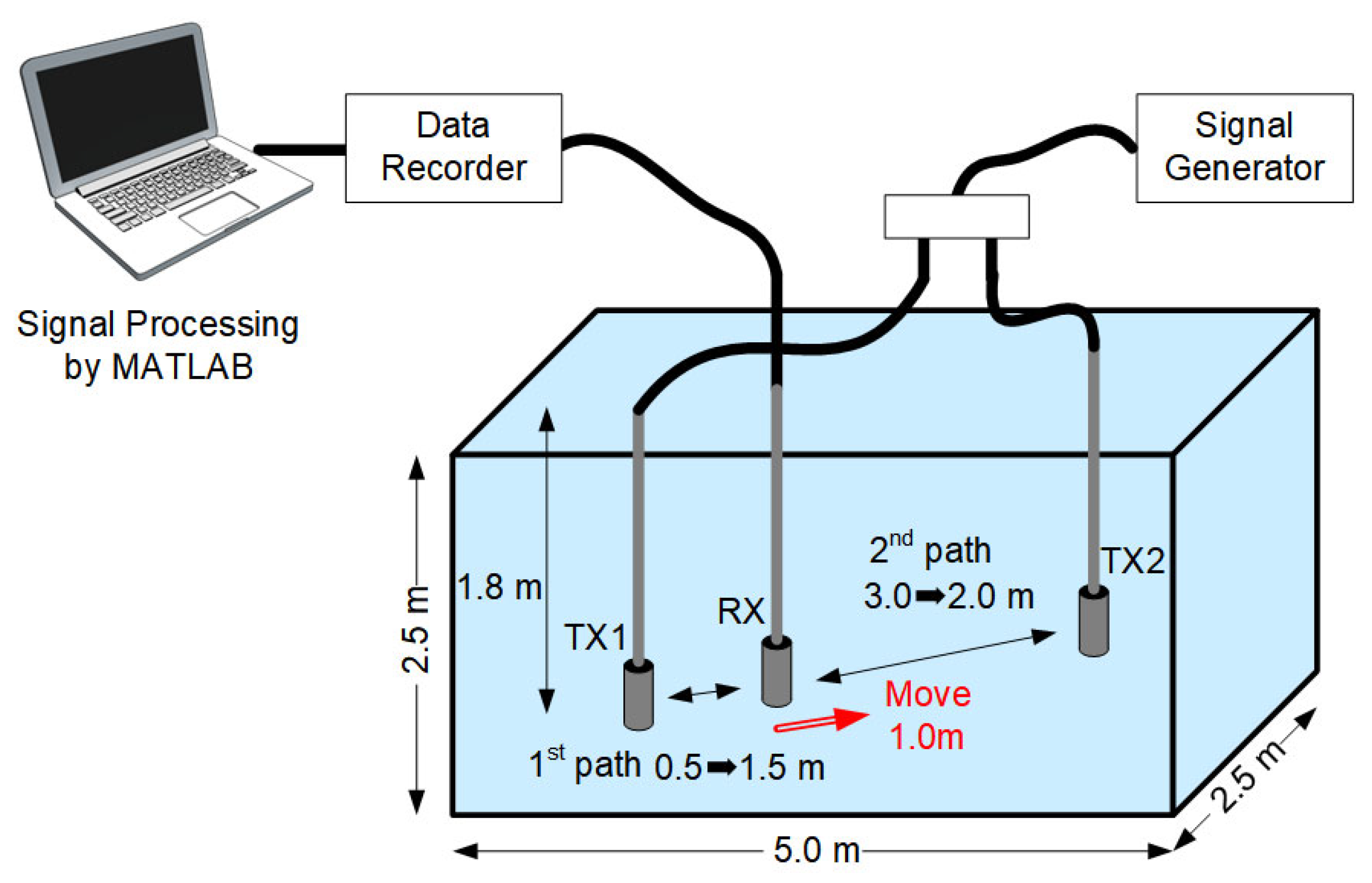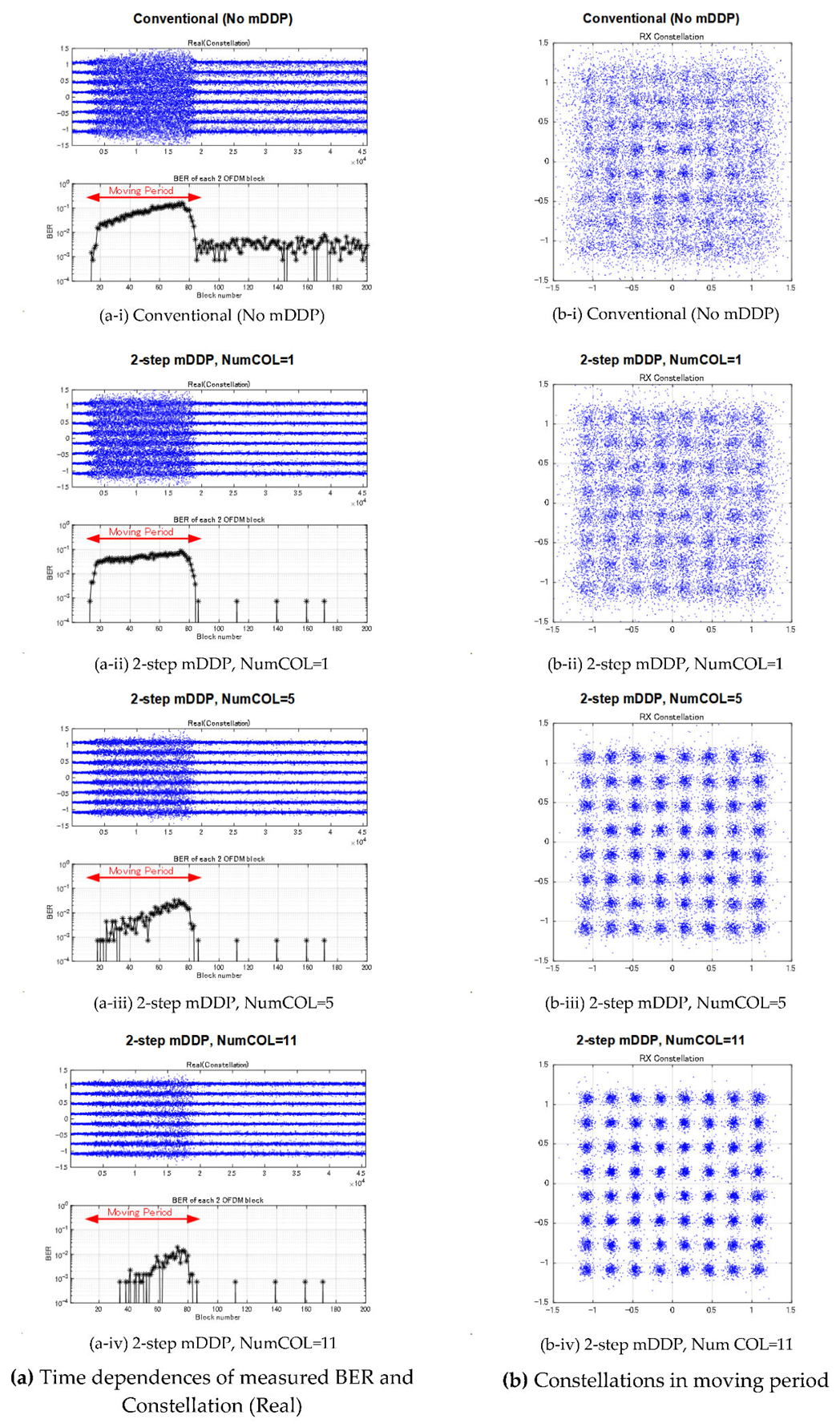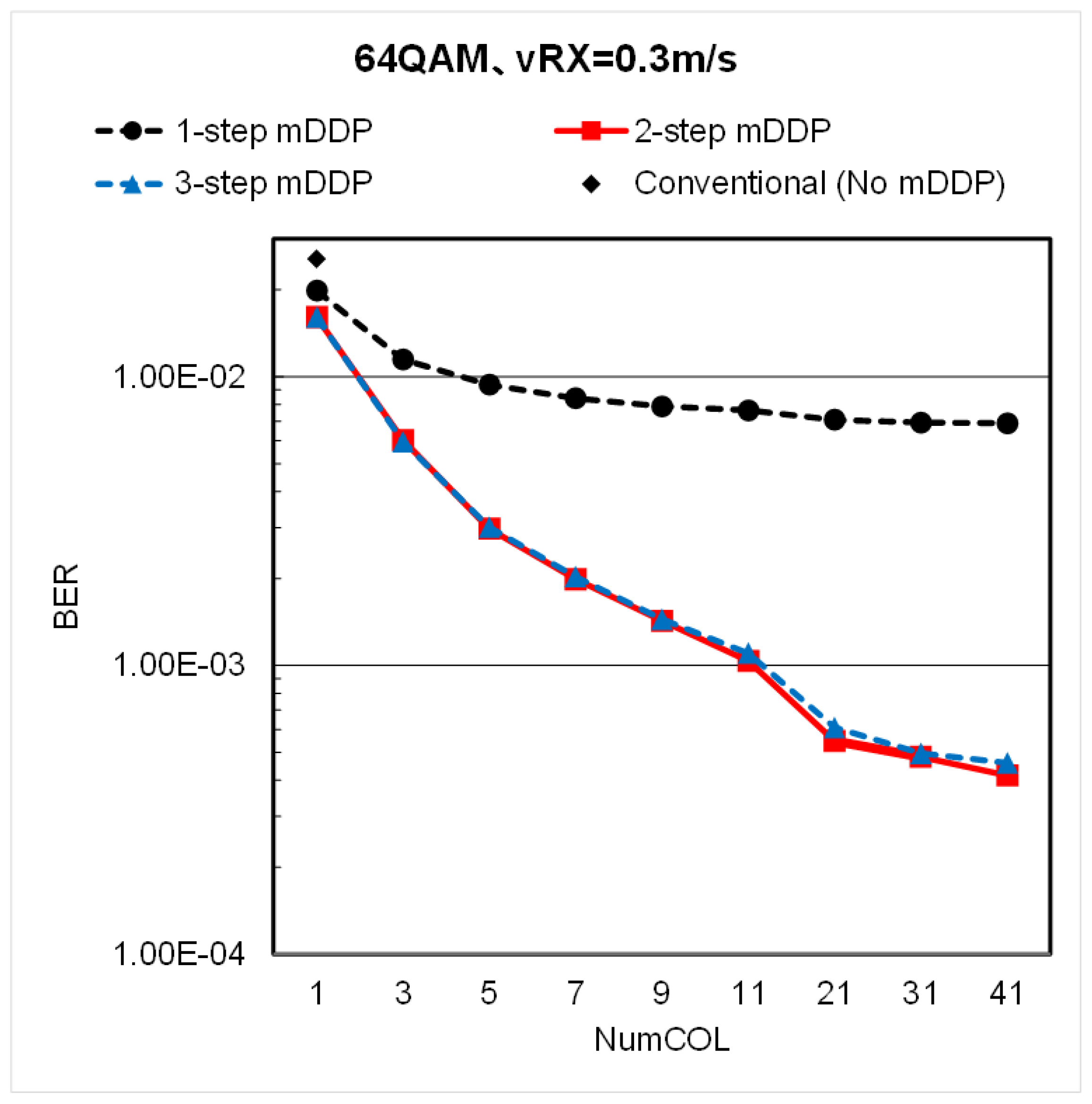1. Introduction
Underwater wireless communications are used in many applications to reduce cable costs and deployment time, such as harbor and shoreline monitoring, fish monitoring, and monitoring of drilling sites such as oil wells and trenches [
1]. To increase data bandwidth, orthogonal frequency division multiplexing (OFDM)-based wireless communication systems have received widespread attention for their high transmission rates and high spectrum efficiency, even for underwater applications. Since Doppler shift occurs in underwater wireless communications due to the movement of equipment and vessels, signal processing is required to compensate for the Doppler shift. So far, our research team has proposed a time-domain signal processing algorithm for Doppler compensation of Desired propagation path [
2,
3,
4].
In 2023, we proposed a modified delay and Doppler profiler (mDDP) as a frequency domain signal processing to combat inter-carrier interference (ICI) in underwater acoustic OFDM mobile communications in multipath environments [
5,
6]. However, the performance improvement in computer simulations and pool experiments was not remarkable. In a subsequent study, the accuracy of the Channel Transfer Function (CTF), which is the input for the mDDP channel parameter estimation, was considered insufficient. Then a 2-step mDDP was devised.
In this paper, the performance of underwater OFDM communications using 1- to 3-step mDDPs are compared by computer simulation, assuming a two-wave multipath environment subject to Doppler shift in the opposite direction as shown in
Figure 1. Section II presents the details of the proposed UWA OFDM communication system using multi-step mDDP. In Section III, computer simulation results are presented. Finally, in Section IV, the conclusions will be given.
2. Multi-Step mDDP Based ICI Canceling UWA OFDM Communication System
In the two-wave multipath environment shown in
Figure 1, Path #1 and Path #2 are affected by backward Doppler shift when the receiving device moves. Therefore, as shown in
Figure 2, the received signal is expanded or shrinked in underwater acoustic communication. Then we have previously introduced resampling and de-rotation to OFDM receiver as shown in
Figure 3 [
3]. The performance in mobile reception is improved by detecting the Desired Path signal with high intensity and stretching the received signal in Resample and De-rotation processing. However, if the Doppler shift of the second wave is different from the first wave, as in this case, the second wave is affected by the Doppler shift and generates ICI.
Figure 4 shows a proposed mDDP based OFDM receiver, which does not have resample and de-ration. Although the 2-step configuration is the main focus, the figure shows 1- to 3-step mDDPs available for simulation comparison.
Detail system parameters are listed in
Table 1. The sub-carrier spacing of OFDM is 50Hz, then effective OFDM symbol duration is 20ms with 2048 points IFFT/FFT as modulation/demodulation. To estimate CTF, two kinds of pilot signals are inserted in Time-Frequency sub-carriers’ arrangement as shown in
Figure 5. The blue circles for CTF estimation are scattered pilots which is inserted every 2 row and every 2 columns. The other yellow circles are continuous pilots for tracking phase-change in time domain.
Modified Delay and Doppler Profiler (mDDP) estimates a combination of multiple Doppler-shifted propagation paths and their parameters such as attenuation, relative delay, Doppler-shift and sampling CLK error as shown in
Figure 6. The FFT of the OFDM demodulation generates data symbol
as expressed in Eq. (1) as shown in the original mDDP paper [
5,
6] and DDP papers [
7,
8,
9].
where
is sending data symbol of sub-carrier index n at the
OFDM symbol,
is additive noise that corresponds to the
sub-carrier in the
OFDM symbol and
is the transfer function from symbol
to the
sub-carrier. If
,
represents the influence of ICI.
can be expressed as Eqs. (2), (3a) and (3b).
where
is normalized frequency offset of
path. From Eq. (1), the inputs such as
and
of mDDP in
Figure 6 can be approximated as Eqs. (4a) and (4b).
However, this approximation totally ignores the effect of ICI component. When the effect of ICI was large, there was a problem that the accuracy of mDDP parameter estimation deteriorated significantly. Therefore, after the second step mDDP, the inputs shown in Eqs. (5a) and (5b) are used.
where
can be calculated by Eqs. (2), (3a) and (3b) using the parameters from 1st mDDP; and
can be obtained by hard decision of multi-tap equalizer outputs. As explained above, the 2-step mDDP is expected to improve the accuracy of the mDDP estimation parameters by improving the accuracy of the input signal.
3. Computer Simulations
Figure 7 shows computer simulation model assuming non-reflection pool experiment. Two transmitting transducers TX1 and TX2, 3.5 meters apart, are used to model multi-path environment. A receiving transducer RX moves 1.0 meters from 0.5 meters from TX1 in the direction of TX2 with speed of 0.3 m/s. OFDM signal length is about 10.0 ms with 400 OFDM symbols. Calculated 1st to 2nd received wave delay time and Desired (1st wave) and Undesired (2nd wave) power Ratio (DUR) are shown in
Figure 8. Applied Carrier to Noise Ratio (CNR) is 40 (dB).
Figure 9(a) shows the time dependences of measured Bit Error Rate (BER) and the real value of 64 QAM constellation of conventional receiver and 2-step mDDP receiver with NumCOL=1, 5, 11 (the number of taps in the multi-tap equalizer).
Figure 9(b) shows 64QAM constellations in the moving period for the same cases. As can be seen from these figures, in the 2-step mDDP, constellation disorder decreases and the BER value decreases dramatically as the value of NumCOL is increased.
Figure 10 summarizes simulated BER with changes of NumCOL for conventional and 1- to 3-step mDDP. Increasing from 1- to 2-step dramatically reduces the BER value, but increasing to 3-step has no effect. There is a dependence of BER reduction on increasing NumCOL values, especially in 2-step. 2-step mDDP scheme reduces inter-carrier interference dramatically.
4. Conclusions
Basically, modified Delay and Doppler Profiler (mDDP), which estimates not only attenuation, relative delay and Doppler shift but also sampling clock shift of each multi-path component, combined with ICI canceling multi-tap equalizer reduces inter-carrier interference between OFDM sub-carriers. With 1-step mDDP, the BER reduction was limited by the degradation of the estimation accuracy of those parameters, but with 2-step mDDP, dramatic ICI cancellation can be achieved.
In a simulation of a two-wave multipath environment where the receiving transducer moves at a speed of 0.3 m/sec and is subject to backward Doppler shift, increasing NumCOL, the number of taps in the multi-tap equalizer that removes ICI, the BER of 0.016 at NumCOL = 1 was reduced by 2-step mDDP, the BER at NumCOL = 41 was significantly reduced by about a factor of 40 to 0.00041.
Author Contributions
Conceptualization, T.W.; methodology, T.W.; software, S.O.; validation, S.K., S.O., H.Y., R.S. and T.W.; formal analysis, S.K.; investigation, S.K., H.Y. and T.W.; resources, H.Y.; data curation, S.K. and S.O.; writing - original draft preparation, S.K.; writing - review and editing, R.S. and T.W.; visualization, S.O. and R.S.; supervision, T.W.; project administration, T.W.; funding acquisition, H.Y. All authors have read and agreed to the published version of the manuscript.
Funding
This research received no external funding.
Data Availability Statement
The data contained in this article are available from the corresponding author upon reasonable request.
Acknowledgments
We are very grateful to OKI Com-Echoes Co., Ltd for allowing us to use their anechoic pool for our experiment.
Conflicts of Interest
The authors declare no conflicts of interest.
References
- Heidemann, J.; Stojanovic, M.; Zorzi, M. Underwater sensor networks: applications, advances and challenges. Philos. Trans. A Math. Phys. Eng. Sci. 2012, 370, 158–175. [Google Scholar] [CrossRef] [PubMed]
- Suzuki, T.; Wada, T.; Yamada, H.; Nakagawa, S. An underwater acoustic OFDM communication system with robust Doppler compensation. International Journal of Computer Science and Network Security 2017, 17, 172–179. [Google Scholar]
- Hoq, M.A.; Oshiro, S.; Wada, T. Two steps Doppler compensation Algorithm from moving AUV to AUV/Mother Ship for OFDM-based UWA communication system. International Journal of Computer Science and Network Security 2020, 20, 272–278. [Google Scholar]
- Oshiro, S.; Muller, Y.; Yamada, H.; Wada, T. An UWA OFDM Communication System with Improved Doppler compensation and Initial Synchronization. In Proceedings of the OCEANS 2022, Hampton Roads, 2022/10/17, 2022; pp. 1-6.
- Oshiro, S.; Akioya, C.; Yamada, H.; Wada, T. A Prototype ICI Canceling Underwater OFDM Communication System for Multi-Path Doppler Channel. In Proceedings of the OCEANS 2023 - MTS/IEEE U.S. Gulf Coast, 2023/9/25, 2023; pp. 1-6.
- Akioya, C.; Oshiro, S.; Yamada, H.; Wada, T. A Modified Delay and Doppler Profiler based ICI Canceling OFDM Receiver for Underwater Multi-path Doppler Channel. International Journal of Computer Science and Network Security 2023, 23, 1–8. [Google Scholar]
- Nakamura, M.; Itami, M.; Itoh, K.; Aghvami, H. ICI Cancellation Technique based on Estimating Delay and Doppler Profile in OFDM Reception. The Journal of The Institute of Image Information and Television Engineers 2002, 56, 1951–1958. [Google Scholar] [CrossRef]
- Nakamura, M.; Fujii, M.; Itami, M.; Itoh, K. MMSE ICI Canceller for OFDM Mobile Reception. The Journal of The Institute of Image Information and Television Engineers 2004, 58, 83–90. [Google Scholar] [CrossRef]
- Yamazaki, A.; Nakamura, M.; Fujii, M.; Itami, M.; Itoh, K.; Ohta, H. A study on improving performance of an OFDM ICI canceller. The Journal of The Institute of Image Information and Television Engineers 2005, 59, 94–101. [Google Scholar] [CrossRef]
|
Disclaimer/Publisher’s Note: The statements, opinions and data contained in all publications are solely those of the individual author(s) and contributor(s) and not of MDPI and/or the editor(s). MDPI and/or the editor(s) disclaim responsibility for any injury to people or property resulting from any ideas, methods, instructions or products referred to in the content. |
© 2024 by the authors. Licensee MDPI, Basel, Switzerland. This article is an open access article distributed under the terms and conditions of the Creative Commons Attribution (CC BY) license (http://creativecommons.org/licenses/by/4.0/).
